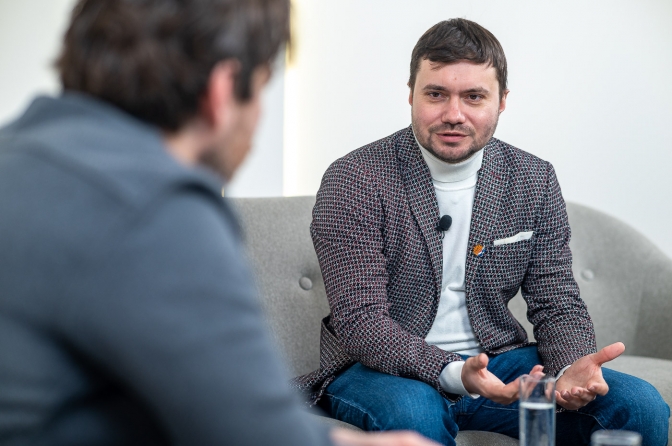
[For daily insights from throughout Ukraine, follow Ukrainian Freedom News on Telegram]
«Kolegi Studio» was founded in 2014, when critical, stormy events were taking place. In 2018, your sketch show «Nashi bez Rashi» (Ours without Russia) was released, becoming popular throughout Ukraine. I am thinking about this title. Will it be relevant after the war?
Perhaps not. I thought for a long time about the fact that we are already becoming «without Russia». It should be called simply «Nashi» (Ours) if we do something like sketches in the future.
It’s surprising, but in 2019 I looked at a survey, and 74% of Ukrainians had a favourable attitude towards Russia and Russians. That is, did «Nashi bez Rashi» sound somehow provocative at that time?
We were a niche thing, showing: «You see, these are enemies, they are not our people, and we have to do without them.» In fact, everyone messages us: «You are «Simpsons», you saw the future. It happens just as you said: a trench near Russia, this thing, the other one.» I answer: «No, friends, the difference is that our war started in 2014, and your one – in 2022. That’s the whole difference between us.»
Read also: «A bad movie shot with state money destroys culture like a bomb dropped on a museum
That is, as soon as you arrived at the front line, you immediately understood that there would be a big war. All professional soldiers were preparing for it. Even now, we cooperate with Azov. In Mariupol, they had a maintenance plan for each house, the plan of who should do what. In fact, they were preparing for it, they knew what would happen. And the Ukrainians who lived in Kyiv, Dnipro, Zaporizhzhia, and Odesa, were thinking: «Well, this is a conflict somewhere in the east. Something was squeezed out of us there, some land. Well, Crimea was taken, but nothing terrible is happening, and the Russians are not so bad.» As we presented this problem, the world, apparently, perceived it that way. And we have the result: if you don’t give a damn about evil from the first day, then evil understands that it can go unpunished and does what it wants. I believe «Nashi z Rashi» was such an interesting moment that showed: «This is the enemy, we have to remember it.» And in fact, now the enemy has become an element that united Ukraine. We united not for something, but against someone, which is also good, in principle.
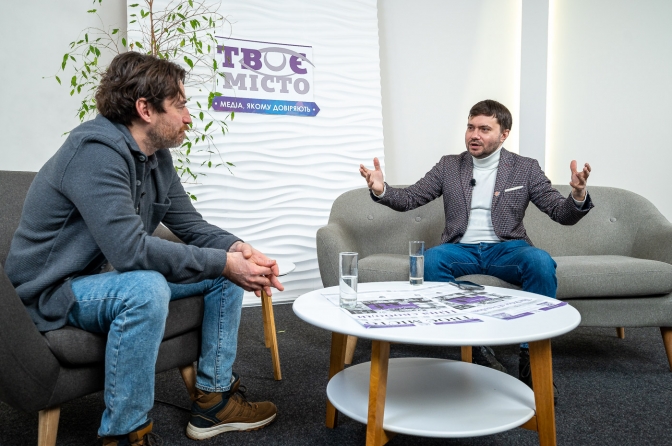
Even regarding the niche. As I recall, at the beginning of the 1990s in Ukraine, some kind of [Russian] «Maski-show» was played endlessly, where there was a certain Ukrainian Mykola, a bottle, moonshine…
This is the problem of Ukrainian humour. There are many alternative teams that showed other stories about Ukrainians. Not sharovarshchyna [primitivized folk-image of Ukrainians wearing sharovary – wide «Cossack» trousers], not «Mykola, lard, beets and potatoes», but intellectual personalities. I myself work in an IT company, as a vice president in talent management, and I see how Ukrainians can compete with the same Europeans and Americans in certain positions. I had the experience of personally working in China, leading a team there, coming and making changes as a Ukrainian. I have seen many successful Ukrainians in management, sports, and business who can make a big difference. And it seems to me that «Nashi bez Rashi» is precisely about showing that this is a country of the future with a fairly strong economy. And this is how, in fantasy, it can be presented to the viewer. And whether he believes it or not depends on how we work. Our task was to make them believe. We spent a lot of money on the costumes, the picture so that people would believe in the story and that it is possible. Because if it was shot cheaply, people wouldn’t believe it: «Ah! This is a fairy tale, this will never happen to Ukraine!» But when you put the «right» light, put on the costumes and say: «Believe me, this is possible!» – then it works.
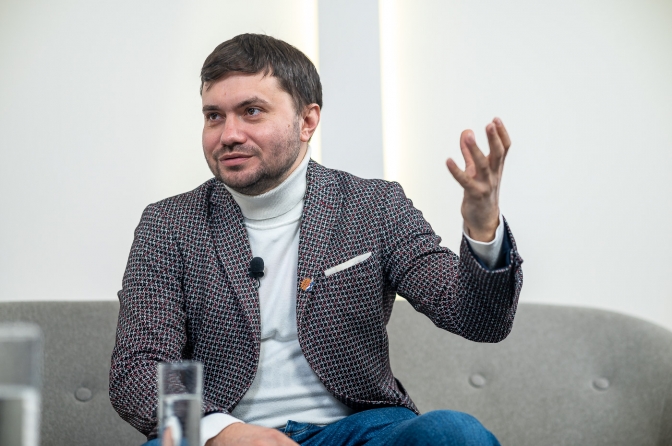
Why did you remain a niche team for so long? Didn’t you yourself get annoyed that so many people are interested in Russian humour? In general, can we say that there is some Russian humour and its influence on Ukraine?
I think yes. It is necessary to understand which humorous currents exist. The American one comes from stand-up, and the Russian comes from KVN [Soviet and Russian comedy show, founded in 1961]. These are different forms: stand-up is an individual performance, KVN is the group one. Accordingly, most of the humour in Ukraine is «Kvartal 95», «Diesel Show», including me with the «Nabla» team from Lviv, the vice-champions of Ukraine from KVN. In Russia we performed in Russian, in Sochi we were... We have different hearts sins with which we have to go to church and explain it many times to the priest. It seems to me that only now, during the war, stand-up began to develop very strongly. It’s actually a form where people just take the microphone and show the pressing issues. From the point of view of sketch comedy, this is also an American thing. We went over a lot of things. I am delighted with Little Britain, from which the Russians made «Nasha Rasha» (Our Russia) – simply copied their concept. In the second case, «It is a big Russia», and in the first one – «This is our little Britain».
Literally, everything is copied, but the point is that they always add something of their own. Rap becomes «hookah rap», Late night show – Urgant show.
This is also a completely American format that they took and simply implemented with a good charismatic actor [Russian TV host Ivan Urgant]. Why did we have all this for so long? Because where comedians were «raised», it was from the Russian side, in the same KVN. And then, our own «League of Laughter» appeared, a stand-up act. It seems to me that now a lot of Ukrainian comedians will come out of stand-up, and they will be popular throughout the country.
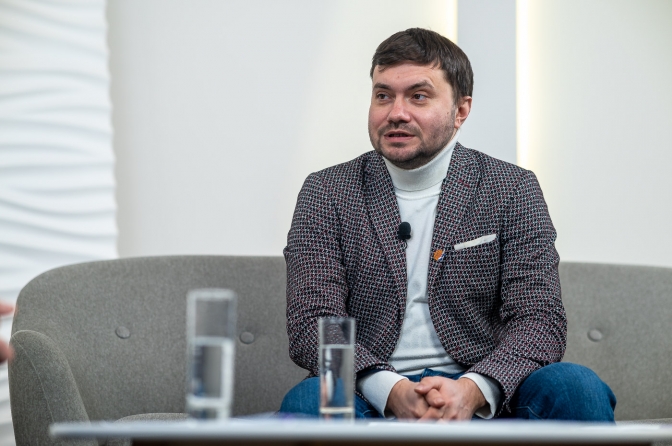
At some point, could you earn more, have a better career, if you chose to speak Russian?
At that time – yes. Then, as a KVN player, you could join «Kvartal» or «Diesel Show» and earn money. But the idea of «Nashi bez Rashi» was to make it niche. I never set myself the task of going to the mass market. Because mass marketing is when you write humour that people like, and not the one that you like. The idea of the show «Nashi bez Rashi» was to make something very small and compact. We started doing it here, at Kopalnia Kavy [cafe in Lviv]. How many people will sit there? 100-110. I liked when the tickets were sold in 15 minutes – I was very happy, it inspired me, I loved it. A niche, closed cabaret, with complicated access. People came from Poltava, Zaporizhzhia to buy a ticket and come to a cabaret evening in Lviv.
Cabaret is the third subgenre, from which many things have also grown. This is a performance in the theatre, the same Late night show, more British, which has also developed in the United States. But does success always have to be a mass market, which means lower quality? There is «Monty Python» – a troupe that initially had no comedians. They were doing a children’s show as I remember.
I would like to go out with our team, which is very small. When we shoot «Nashi bez Rashi», 25 people are involved in this work. But we really have three actors, four authors, and the whole team – five people. And when we do some project, like now we are preparing a concert on April 7 in the October Palace in Kyiv, the team increases to 15-20 people: band, administrators, managers, props, costumers. In addition, we have a lot of different images, we need to change beards, glue them – it’s all theatre. I always wanted to make a humorous theatre, not that the humour was in the format of a variety show and a show, so that it was more of a theatrical story.
Read also: «We are drops that make up the ocean.» This is how Lviv bloggers help the army
Now it is also needed, it is our weapon, which we can use to speak, which helps to raise funds. With four sketches, we generated a million hryvnias in donations, spending one day on filming, and we can buy «banderomobiles» [infantry vehicles for the Armed Forces]. Each period has its own task, and we must be a team that responds to the challenges that arise in the state.
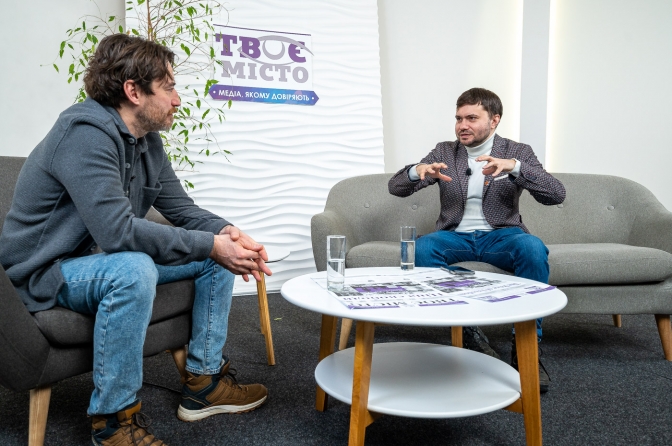
Recently, a stand-up artist from Sumy, Felix Redka, performed in Lviv. And this performance turned into a scandal because of a joke about language. This story is evaluated in different ways: someone supported Redka and accused the audience of being intolerant and generally idiots. Someone, on the contrary, said that Redka was a Russian-speaker until recently and remained «Russophile», that he was to blame, and so on. What did you see in this story?
I have a colleague Roman Reznikov at work, he is from Donetsk. In 2014, he fled the war, moved to Kyiv, then to Lviv. He still communicates in Russian, although he sometimes tries to switch to Ukrainian. He is a patriot of Ukraine, I personally see it. It’s just that the context in which he grew up is different than the one in which I did. He reports, makes projects, travels to various conferences, shows the problem of war. He has been doing this since 2014 when the war caught him in Donetsk. It is important to understand that it is very easy to love Ukraine from Lviv, they say. I know all the Ukrainian songs, who are our leaders, Ukrainian Insurgent Army, Bandera since kindergarten. It took them a long time to come, so I think we still have to consider the context.
Read also: «Song is our philosophy, a bundle of energy.» Interview with a folk researcher Ulyana Horbachevska
I regret very much because there was an opportunity to do the «Nashi bez Rashi» concert in Mariupol, the date was almost set, but certain things did not work out. Those people for whom it would be a breath of fresh air might not be many, but they would have gotten it, strengthened it and continue to defend their position.
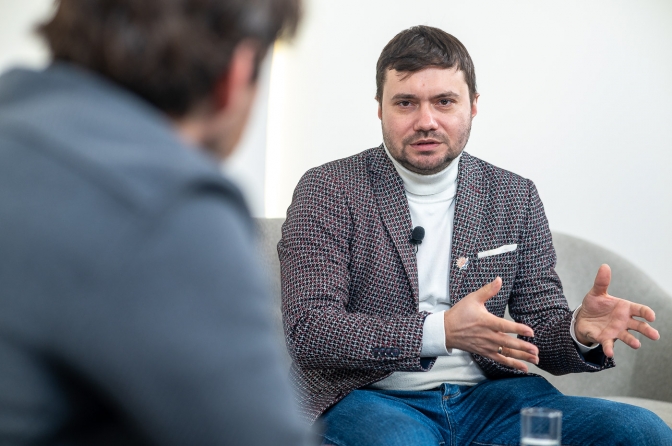
I would really like to believe that most of these people are alive now, not in Mariupol, maybe in Kyiv, Lviv, and some even abroad. But they will all still be able to gather for this concert someday.
I hope so. Now, «Nashi bez Rashi» is being filmed at public’s expense. There are such donations: «We will read your name from the stage in Luhansk, at the People’s Theater, in Sevastopol.» People donated a lot, I have these lists, and someday, hopefully, we will do concerts in these theatres, and I will read the names of the people who donated to the show «Nashi bez Rashi».
Andrii Saichuk spoke
Text: Marichka Ilyina, translated by Vitalii Holich
Full or partial republication of the text without the written consent of the editors is prohibited and considered a violation of copyright.
Follow us on Facebook and Instagram. Lviv Now is an English-language website for Lviv, Ukraine’s «tech-friendly cultural hub.» It is produced by Tvoe Misto («Your City») media-hub, which also hosts regular problem-solving public forums to benefit the city and its people.












